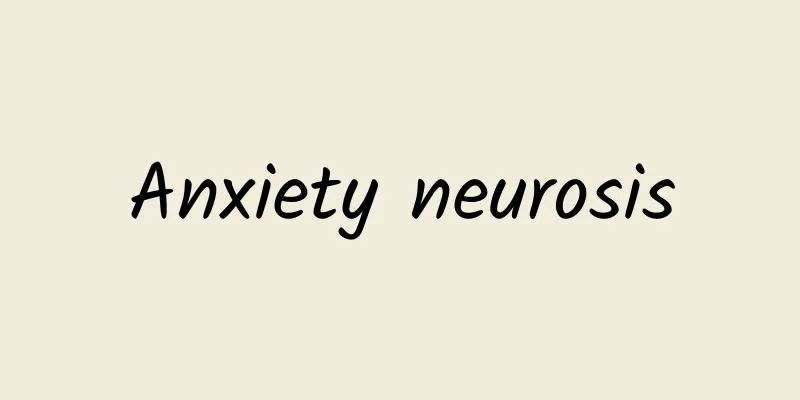Anxiety neurosis

|
As the name suggests, anxiety neurosis is a nervous system disease caused by anxiety. Many patients show symptoms of nervous system anxiety. Even simple daily work can cause a sense of anxiety. They feel afraid of many things. At the same time, facing different people and things will make them nervous, which hinders the functioning of the brain nerves. In addition, patients feel that bad things are always about to happen. They are restless at night, have nightmares, feel at a loss, and easily wake up, feel upset and unable to rest well. When faced with this anxiety neurosis, many patients are more concerned about the cause of the disease. The worry and anxiety expressed by the patients, as well as the difficulty in controlling their emotions in daily life are all symptoms of anxiety neurosis. Correctly understanding anxiety disorder is the key to treatment. The following is a brief introduction to the causes of anxiety neurosis. First, although physical illness or biological dysfunction is not the only cause of anxiety disorder, in some rare cases, the patient's anxiety symptoms can be caused by physical factors, such as hyperthyroidism and adrenal tumors. Many researchers have tried to find out whether the central nervous system of anxiety patients, especially certain neurotransmitters, is the culprit for causing anxiety. Much research has focused on two neurotransmitters: norepinephrine and serotonin. Many studies have found that when patients are in an anxious state, their brain levels of norepinephrine and serotonin change dramatically, but it is not certain whether these changes are the cause or result of anxiety symptoms. Second, cognitive processes, or thinking, play an extremely important role in the development of anxiety symptoms. Studies have found that people with depression are more likely than the average person to interpret ambiguous or even benign events as harbingers of crisis, are more likely to believe that bad things will happen to them, are more likely to believe that failure awaits them, and are more likely to underestimate their ability to control negative events. Third, anxiety disorders are more likely to occur when there are stressful events. 1. Genetic factors: They play an important role in the occurrence of anxiety disorders. The comorbidity rate among blood relatives is 15%, which is much higher than that of normal residents; the comorbidity rate of dizygotic twins is 2.5%, while that of monozygotic twins is 50%. Some people believe that anxiety disorders are the result of environmental factors acting together through susceptibility, which is determined by genetics. 2. Personality traits before illness: inferiority complex, lack of self-confidence, timidity, cautiousness, prone to tension, anxiety or mood swings due to minor setbacks or physical discomfort. 3. Mental factors: Minor frustration and dissatisfaction and other mental factors can be inducing factors. 4. Biological factors: The physiological basis of anxiety response is the general hyperactivity of the sympathetic and parasympathetic nervous systems, often with excessive release of adrenaline and norepinephrine. The manifestation of physical changes is determined by the characteristics of the patient's sympathetic and parasympathetic nervous system balance. There are different opinions about the pathogenesis. Some scholars emphasize the connection between the "emotional center" such as the amygdala and hypothalamus and anxiety, and the discovery of benzodiazepine receptors in the limbic system and neocortex, and put forward the "central theory" of anxiety; some people support the "peripheral theory" of anxiety based on the fact that β-adrenergic blockers can effectively improve physical symptoms and relieve anxiety. The psychoanalytic school believes that anxiety is the result of the inner conflict of progress and the threat to the self. Scholars based on the "learning theory" believe that anxiety is a habitual behavior. Due to the conditioned connection between anxiety-inducing stimuli and neutral stimuli, the conditioned stimuli are generalized, forming widespread anxiety. Lader proposed: Genetic quality is an important psychological and physiological basis of this disease. Once a strong anxiety reaction is produced, anxiety disorder is formed through environmental reinforcement or self-reinforcement. The most common cause of anxiety neurosis is genetic history. The anxiety nerves produced by the nervous system are transmitted to the patient's own emotions, which becomes the patient's inferiority, timidity, and cautious character. Anxiety neurosis is also caused by one's own physical factors. Therefore, if this disease is discovered, you should go to the hospital for treatment in time. Seek medical treatment properly and do not take medicine casually. Maintaining a good mental and psychological state is the key to treatment. |
>>: Precautions after mydriasis
Recommend
What to do if the cyst becomes purulent and ruptures
Pimples are a common name, professionally called ...
What Chinese medicine can promote ovulation?
If a couple wants a baby, the male's sperm an...
What to do if your period is too light? Traditional Chinese medicine has a way to regulate it
Scanty menstruation is one of the common menstrua...
What is pituitary disease in women?
Pituitary gland disease is a very common disease ...
What does treatment for hemangiomas include?
Many people know about hemangioma in their daily ...
Why does my child always have nosebleeds?
Many parents are troubled because their children ...
TCM Syndrome Differentiation of Lung Qi Deficiency
Lung Qi deficiency syndrome refers to the symptom...
What should you pay attention to after a head fall?
Bumps and bumps are very common in life. Some peo...
Testicular puncture without sperm
If no sperm is detected after a testicular punctu...
Baby's nail base skin turns black
If the skin at the base of the baby's nails i...
The efficacy of wolfberry wine, how to make wolfberry wine
Wolfberry is a commonly chosen Chinese medicinal ...
The efficacy and function of ylang-ylang essential oil
When watching many palace fighting dramas, ylang ...
Ten-month-old baby food intake standard
The main source of nutrition for newborns is brea...
What are the Chinese patent medicines for nourishing the spleen and stomach?
After being baked by the high temperatures in the...
How long does it take for the fever to subside after taking the anti-inflammatory injection?
The common cold is the easiest and most common ca...









